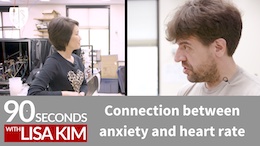News Mentions for the week of April 10, 2023
Our experts are often called upon to provide insight on current events and topics in the news. Here are some of the articles Stanford Psychiatry faculty have been interviewed for in recent weeks.
- NEXTpittsburgh
How the Pittsburgh-based Freedom House Ambulance Service changed everything
Freedom House Ambulance Service was America’s first ambulance service, staffed by Black citizens trained to save lives. Matthew Edwards, assistant professor of psychiatry and behavioral sciences, who had recently given a talk on the subject, is mentioned.
- Borneo Bulletin Online
Dealing with nocturnal panic attacks
Whether you’re ticking through tomorrow’s to-do list or dwelling on past regrets, it’s normal for worries and fears to surface at night, experts said. Rafael Pelayo, clinical professor of psychiatry and behavioral sciences, provides comment.
- Health
Postponing Bedtime By Just 34 Minutes Could Increase Your Risk of High Blood Pressure
Even slight fluctuations in bedtime—as little as 34 minutes—may increase a person's risk of high blood pressure, or hypertension, according to new research published in Hypertension, a journal from the American Heart Association. Clete Kushida, professor of psychiatry and behavioral sciences, provides comment.
- Scope Blog - Stanford Medicine
For better video meetings, try taking turns talking
Stanford Medicine scientists have identified how virtual interactions stilt our conversations and what that looks like in the brain. Stephanie Balters, postdoctoral scholar in the lab of Allan Reiss, the Howard C. Robbins Professor in psychiatry and behavioral sciences, are featured.
- StanfordMed TODAY
‘Pushing to move mountains’
Rania Awaad, clinical associate professor of psychiatry and behavioral sciences, has been nationally recognized for her work in destigmatizing mental health and addressing suicide in Muslim communities.
- 90 Seconds w/ Lisa Kim - Stanford Medicine
Connection between anxiety and heart rate |
Standing on the edge of a precipice, losing your way in a dark forest or running into a crush will quicken your pulse — a physical consequence of the anxiety you experience. But a new study in mice by Stanford Medicine scientists has found evidence of the reverse: A faster heart rate can generate anxiety. Karl Deisseroth, D.H. Chen Professor of bioengineering and of psychiatry and behavioral sciences, is featured.
- The Mercury News
Google doubles down on sleep sensing
Devices provide information that can encourage lifestyle changes that can lead to better rest. Scott Kutscher, clinical associate professor of psychiatry and behavioral sciences, is quoted.

:max_bytes(150000):strip_icc()/Health-GettyImages-1326470272-d9c6516c4b334e3c9422ba073b62a7fb.jpg)



